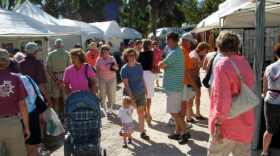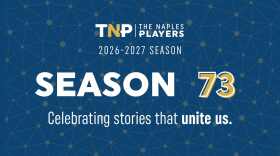Magali Saldana Secos, who goes by Maggie, has had vision problems throughout her life. Despite glaucoma, cataracts, and corneal edema, Maggie was able to maintain sight in her left eye. Three years ago when vision in that eye began to fade, Saldana Secos said she had to learn how to do everyday things, like placing a coffee cup on a table, using her sense of touch.
"It's a huge demanding mental process, because you have to touch first your cup you are not anymore a sighted person you are a touching person now," Saldana Secos said. "So you have to touch your cup and figure out where is the handle, and you have to touch your table in order to be aware that your cup is not at the edge and it will fall."
Saldana Secos said she then had to relearn how to navigate the world around because of the COVID-19 pandemic.
"How to isolate your stuff and not contaminate it with the other members of your family," Saldana Secos said. "And what about if you have one of your family members that goes to work and you don’t see well and you don’t realize how far away you are from them, and then you have to [ask] them, 'please let me know if I am too close to you'.”
Going outside brings a whole new set of challenges for people who are visually impaired, according to Saldana Secos.
"Because sometimes even though you are using your cane, the instincts of the people [who want] to help you out is to go close to you, so the only way to be out for us is to use the shield covering your face," Saldana Secos said.
Saldana Secos credited the Naples-based center for blindness and vision loss, Lighthouse of Collier, for helping to teach her how to protect herself and others during the pandemic.
Wendy Olson is the direct or of programs at Lighthouse Collier. She said like many other organizations, they quickly began offering virtual classes via video conference when COVID-19 cases began to spike in Southwest Florida.
"We’ve offered some classes such as cleaning tips for COVID, we offered a class on how to better organize the kitchen when groceries are coming in, how to be safe and not touch certain things and how to disinfect items without touching it themselves, we’ve also offered classes on grocery delivery options," Olson said.
Olson has taught life skills to visually impaired people for about 20 years and she said both she and the clients she helps have learned a lot during this time.
"There were a lot of steps involved in getting the groups going, training people how to participate," Olson said. "Learning how to put your computer on mute when when other people are talking—a sighted person can just click the button and put it on mute, [visually impaired people] need to learn hotkeys for that. There was a lot of training involved. The pro or the flip side is that our clients or consumers have increased their technology skills because of this,because they’ve had to."
While positive COVID-19 cases are once again on the rise in Florida, Saldana Secos said keeping an open mind keeps her sane during uncertain times.
"The only way to survive is to enjoy your learning process, it's the only way to survive and say, 'oh ok, so I am still a human being so I am still alive'," Saldana Secos said. "In other words, I have to start learning again and take it in that way otherwise, it's crazy."






